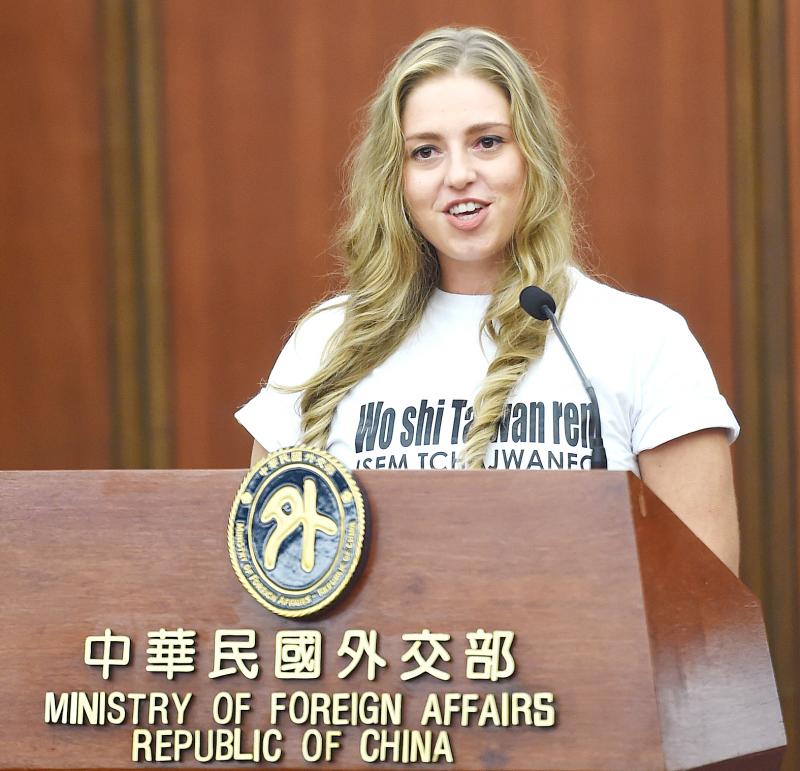Seven Taiwanese universities are to offer 50 scholarships for Czech nationals to study Chinese in Taiwan, one of the achievements of a visit by a delegation headed by Czech Senate President Milos Vystrcil, the Ministry of Foreign Affairs said yesterday.
Deputy Minister of Foreign Affairs Harry Tseng (曾厚仁) and university representatives, wearing T-shirts emblazoned with the words “I am Taiwanese” in Romanized Chinese and Czech, revealed details about the scholarships at a news conference in Taipei.
“I am Taiwanese” refers to a statement Vystrcil made in a speech on Sept. 1 at the Legislative Yuan.

Photo: Liu Hsin-de, Taipei Times
Just as former US president John F. Kennedy supported West Berlin’s pursuit of freedom by proclaiming “Ich bin ein Berliner,” Vystrcil at the time said that he would also like to express his support for Taiwan and freedom with a more humble, but equally strong statement: “I am Taiwanese.”
Tseng thanked Vystrcil and other Czech representatives again for visiting Taiwan from Aug. 30 to Sept. 4, despite pressure from China.
As one of the 22 achievements made by the Czech delegation, the scholarships would be offered by Tunghai University, National Tsing Hua University, National Chengchi University, National Cheng Kung University, National Sun Yat-sen University, Fu Jen Catholic University and Providence University, the ministry said.

Photo: Liu Hsin-de, Taipei Times
Speaking in a videoconference, University of Chemistry and Technology Prague rector Pavel Matejka, who also visited Taiwan with Vystrcil, thanked the ministry for realizing its promise to expand academic cooperation between the two countries.
All of the schools have Chinese language centers recommended by the Ministry of Education, Department of European Affairs Director-General Johnson Chiang (姜森) said.
The scholarships, starting from next year, are to be distributed among the seven universities, which are to decide the conditions and qualifications for selecting applicants, he said.
The schools are to submit their proposals to the ministry, which would offer subsidies for the program, he said, without elaborating on the duration of the scholarships or the amount of the subsidies.
While the ministry has demonstrated its goodwill, it could have presented a more detailed plan or discussed it with the Ministry of Education before announcing it, a source familiar with the matter said.
While the seven schools have submitted their plans, it is not clear why the ministry chose those seven over others that also have Chinese language centers, the source said.
It is also not clear how extensive or how long the program would be, the person said.
If the announcement is intended to be “a gift” for Vystrcil prior to the Czech Senate election on Friday and Saturday, it should have been better planned to become a sustainable project that could benefit more universities, the source added.
Hasty planning might turn the program into a political show without sustainable funding, the source said.
Taiwan is a better place than China for learning Chinese due to its democracy and freedom, while preserving traditional Chinese culture better than many other places in China, Fu Jen Catholic University vice president for mission Leszek Niewdana said.

NATIONAL SECURITY THREAT: An official said that Guan Guan’s comments had gone beyond the threshold of free speech, as she advocated for the destruction of the ROC China-born media influencer Guan Guan’s (關關) residency permit has been revoked for repeatedly posting pro-China content that threatens national security, the National Immigration Agency said yesterday. Guan Guan has said many controversial things in her videos posted to Douyin (抖音), including “the red flag will soon be painted all over Taiwan” and “Taiwan is an inseparable part of China,” while expressing hope for expedited “reunification.” The agency received multiple reports alleging that Guan Guan had advocated for armed reunification last year. After investigating, the agency last month issued a notice requiring her to appear and account for her actions. Guan Guan appeared as required,

Japan and the Philippines yesterday signed a defense pact that would allow the tax-free provision of ammunition, fuel, food and other necessities when their forces stage joint training to boost deterrence against China’s growing aggression in the region and to bolster their preparation for natural disasters. Japan has faced increasing political, trade and security tensions with China, which was angered by Japanese Prime Minister Sanae Takaichi’s remark that a Chinese attack on Taiwan would be a survival-threatening situation for Japan, triggering a military response. Japan and the Philippines have also had separate territorial conflicts with Beijing in the East and South China

A strong cold air mass is expected to arrive tonight, bringing a change in weather and a drop in temperature, the Central Weather Administration (CWA) said. The coldest time would be early on Thursday morning, with temperatures in some areas dipping as low as 8°C, it said. Daytime highs yesterday were 22°C to 24°C in northern and eastern Taiwan, and about 25°C to 28°C in the central and southern regions, it said. However, nighttime lows would dip to about 15°C to 16°C in central and northern Taiwan as well as the northeast, and 17°C to 19°C elsewhere, it said. Tropical Storm Nokaen, currently

PAPERS, PLEASE: The gang exploited the high value of the passports, selling them at inflated prices to Chinese buyers, who would treat them as ‘invisibility cloaks’ The Yilan District Court has handed four members of a syndicate prison terms ranging from one year and two months to two years and two months for their involvement in a scheme to purchase Taiwanese passports and resell them abroad at a massive markup. A Chinese human smuggling syndicate purchased Taiwanese passports through local criminal networks, exploiting the passports’ visa-free travel privileges to turn a profit of more than 20 times the original price, the court said. Such criminal organizations enable people to impersonate Taiwanese when entering and exiting Taiwan and other countries, undermining social order and the credibility of the nation’s